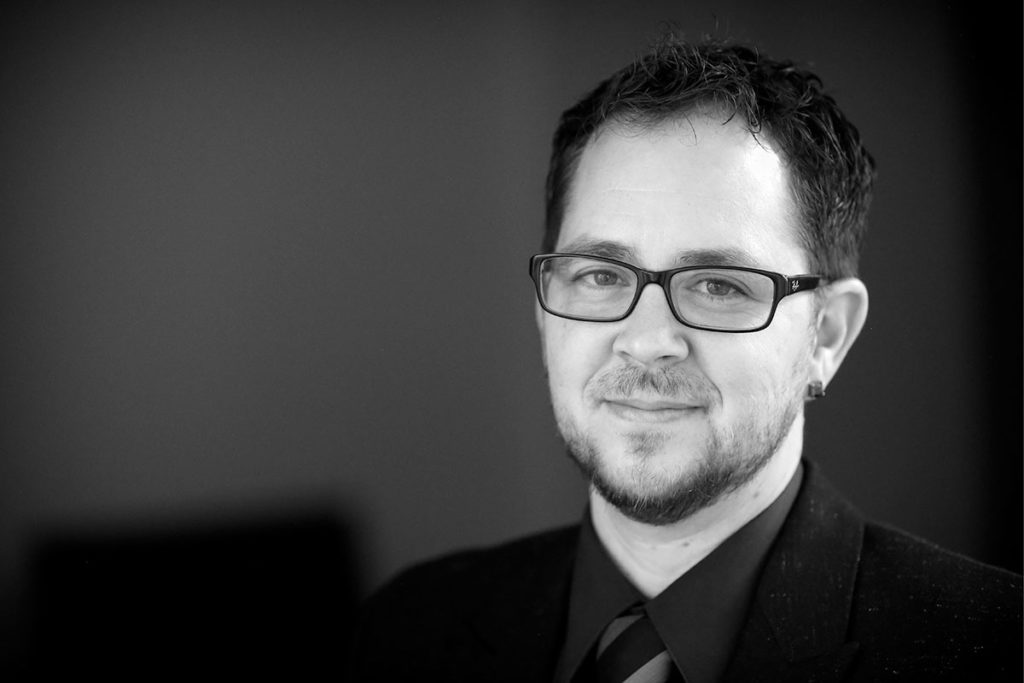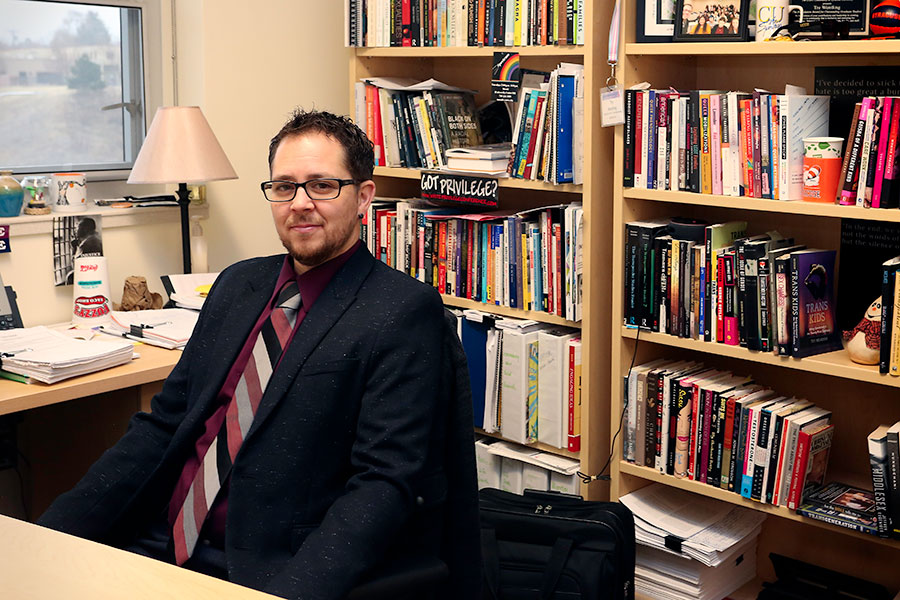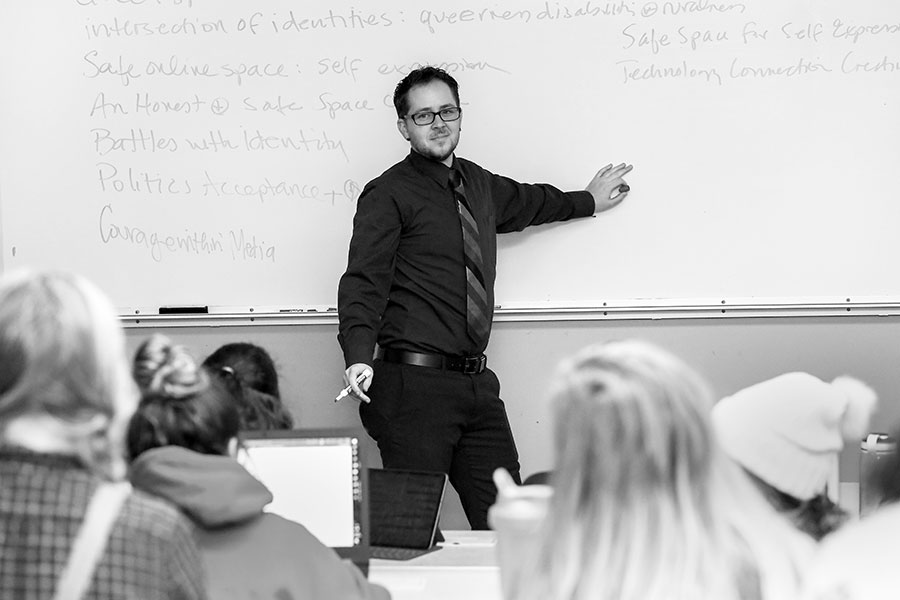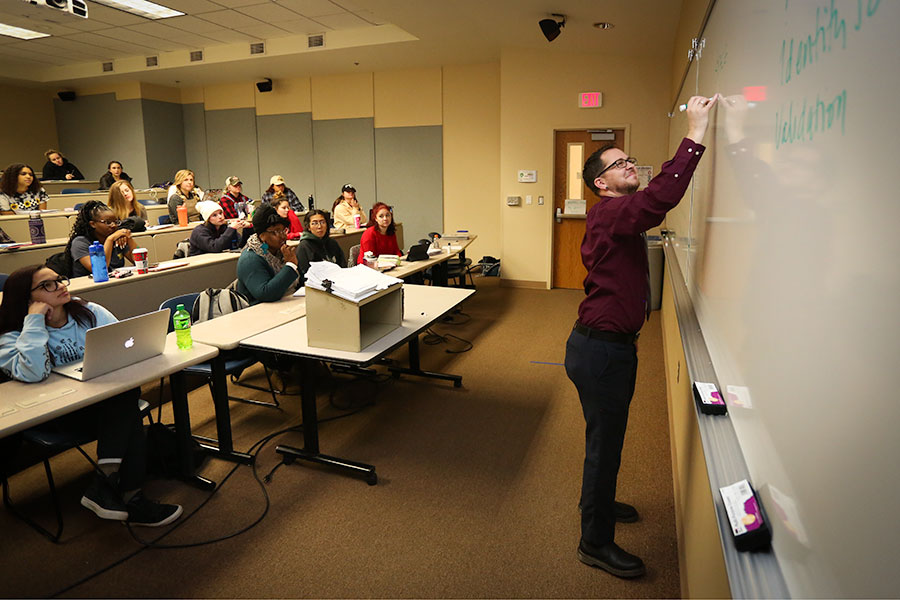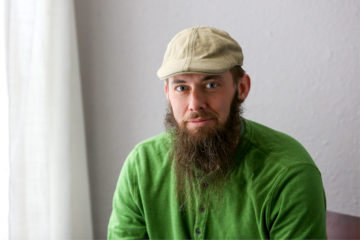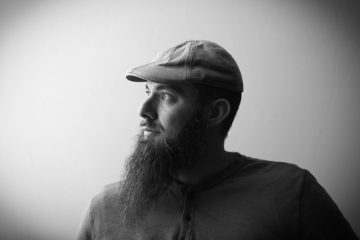On a breezy stroll through the campus of the University of Colorado – Colorado Springs (UCCS), Dr. Tre Wentling talks about history, language and politics of identity.
An assistant professor in Women’s and Ethics Studies at UCCS, Tre also was a student there for his undergraduate and Master’s work in sociology. He earned his Ph.D. at Syracuse University and, after more than 10 years away from UCCS, he returned in the fall of 2018.
When Tre, 39, talked recently with Humanitou, he shared from his experience growing up as a tomboy in an Air Force family and recognizing his true identity at an early age.
He talked about the histories of lesbian and gay and trans- politics. He shined light on language, and how knowledge is used to include and exclude people through the systems in which we’re all complicit. It’s heavy work.
Meet Tre Wentling.
Humanitou: What is your focus at UCCS?
Tre: They hired me for sexuality studies with a specific emphasis on trans and queer scholarship. And while queer scholarship has been around for a good number of decades, this trans- field is relatively new. I think it is emerging pretty solidly because of queer scholarship. There is a relation, but it’s pretty distinct, too.
For me, what that looks like is it is both bringing persons who may identify as or have experience of transgender into focus, but it’s also really thinking about this prefix of trans- and what that means: change, fluidity, going across.
Humanitou: When the word “queer” was used when we were kids, it was derogatory. Now I see and hear the word used in a different way, and it seems that’s after many years of my not encountering the word at all. What has happened with the use of “queer”?
Tre: That is a good point. And it raises something about period-effect. It’s also about reclaiming.
The fact is there are people who might identify as heterosexual and who might identify as gay or pansexual, and have that same reaction of, “That is not a great word.”
In fact, depending on time period and age and place where one grows up, that could be a trigger and remind folks of that pejorative experience.
And also people have reclaimed it as an identity label that somehow says something to others that they are questioning or trying to resist power structures of normativity.
Organizationally, in the late Sixties, Seventies, when there was a gay and lesbian liberation movement that’s forming out on the streets or on the outside of the American Psychological Association’s meaning spaces, there is this idea that that turned into an organizing tactic. And it was one that helped certain laws or policy, or certain belief systems change.
This is where these institutions align, religion and the military. Even though I knew who I was, I knew enough that it wasn’t ‘appropriate,’ it wasn’t ‘right’ to be who I was, to be who I am.
And that is the idea that, “We are just like you and we’ll keep this question of sexuality private.” Like, the assumption is, that other people, especially heterosexual, do too. “We’re everywhere. We’re normal. We’re like you. You don’t even know. We’re your neighbor.”
So it comes out of movement. And also there’s a way in which “queer” has become an umbrella to include gay, lesbian, bisexual, trans and other — perhaps even asexual, for example — identities.
It’s identity, it’s a movement, strategy and then, for organizations, it’s a catch-all. It’s pretty fluid in its use.
Humanitou: This is subject matter that not only you teach, it also pertains to your identity and your experience. And you’ve talked before about that experience while growing up in a military family and within the military culture.
Tre: I think that is why, for me, this scholarship is really important, because it also was not accessible when I was growing up. The Internet wasn’t really a thing.
I remember in 1994 or ’95 when AOL and email was a new thing. We were living in Germany at the time. I didn’t have that kind of access to information at home that seems so ubiquitous now.
For me, coming into this scholarship at an age where identity is still in formation, I think, was lifesaving and also, like, “Wow. Many people need to know about this.”
The military environment as a total institution, which is very masculine and patriarchal, certainly wasn’t going to be the place where you saw gender diversity. And I mean that in the broadest way.
For example, a hair style is very universal and unified, because of a rule. So masculinity itself was really flat, and the one that was promoted.
We spent most of our time in Air Force communities. You might argue that there’s sort of a look for Army, a look for Air Force, a look for Navy, a look for the Marines. That’s what I mean when I say there isn’t much gender diversity even among this pretty-big category of men.
I had glimpses even of gender and the relation to this category “woman” as looking different in the German context also. I could see that there was variety, there was difference.
I also knew very well that there was consequence to performing or to embodying gender differently in this U.S. military context, even though we were living abroad. And even though I had parents that, I think, had different styles and different expectations of how their kids would become gendered.
I knew there were consequences and I also had the ability to dress and wear my hair the way I wanted to, except on traditional holidays when there was an expectation to wear a dress. Beyond those days, I had pretty good flexibility.
Humanitou: Do you recall at what age you were coming to understand who you are and to sense disconnects with social expectations? Was there a particular moment of clarity about who you are — and aren’t?
Tre: I’ll preface this with the caveat it’s my story. Not every other person who might have similar identity experiences that I have would answer this the same way.
I think sometimes that’s the expectation, that we become the spokesman, and that’s not the case. With that said, I think that my experience and story does map onto some general ideas about identity and when that gets formed.
I will say that at 4 years old, I had a sense of knowing, and of the limited language available to me to articulate it. I know the first time I expressed it, I was 5 or 6, and I didn’t do it within my family. So I knew really early.
And in that military environment of heteronormativity, you could get in serious trouble or even harmed physically. The overall hegemony of culture and institution comes together and sets a standard, and you know you’re not upholding that. That is, in part, about not seeing any of that diversity, there being no open conversations.
At 8, I knew to publicly react in disgust when you see two men together. And I did that. I also did that because that’s somehow a part of the knowing.
I also was raised in religion. I was raised as Catholic. I can tell you today some of the teachings that I hear and I’m, like, “Oh, lord. That’s oppressive and that’s not helpful.” Then, I don’t know what the language was for me.
This is where these institutions align, religion and the military. Even though I knew who I was, I knew enough that it wasn’t “appropriate,” it wasn’t “right” to be who I was, to be who I am.
I actually believed fully that I would have to establish my own self without family, because I didn’t think my family would accept whoever I was at that age. Of course, I’m that wrong, right? Because they have accepted me.
This is where transgender studies is bigger than. It’s really thinking about that change, that trans-ness. Everybody has transitioned with me in my family. Some people have been better at it than others. Some of it is really process and time.
It’s not an excuse. I’m not excusing anybody for that. But I do think it’s that connection, that intersection between culture, religion, military. Just heteronormativity existing in all these spaces.
Humanitou: How did you process those expectations of wearing a dress for certain occasions?
Tre: Young people who are assigned female at birth and who are girl children, they have a big pass, more than people who are assigned male and are boy children. Big pass. The box allows more room to express gender with some embodied and behavioral diversity, like with dress, than little boys.
There was a pass, I would say, in this language that we are both familiar with: tomboy. I had a pass to a certain point.
Even though I might have been like that one American kid that didn’t look like all the other ones at this age stage, it was still OK. And especially because I was athletic, which is why this idea of tomboy fits, too, right?
At a certain age, where other biological life course things are happening, expectations socially change. So, yes, wearing a dress, every single time, was very annoying. And it’s not that they didn’t know that I was not wanting to do that. Everybody knew I hated wearing dresses.
But it is also true that, at some point, you’ve got to wear it. They’re your parents and you’re not getting out of it, no matter what you do.
Humanitou: I’m curious at what point your family and whoever around you recognized something deeper in who you were and are, rather than passing things off as “tomboy.”
Tre: This is where I think having conversations with multiple people about this would be a beautiful, brilliant focus group model. I honestly cannot speak for them. What I can think about as I put myself in their shoes is there being a dissonance, potentially.
At this point, if you ask my parents, both of them could look back and say, “Oh, yeah. It’s obvious. Clear as day.” But that is a piece of the cultural access to knowledge. When you don’t have the language, it’s hard to imagine; it’s hard to make sense of.
Somewhere along the way there has been a backlash to ‘I can’t say anything right’ or ‘I don’t have the language to speak.’ You might be in the know if you have some language like ‘cisgender,’ but I’m not saying one has to know what cis- is to be part of this conversation.
At this time of development (when I was a child), even “transvestite” was language that didn’t make sense. Homosexuality is a language that didn’t make sense, but might have been the closest to understanding.
Feminist scholarship worked so hard to say, “Wait. Sex is different than gender. It’s not the same.” But culturally these have remained synonymous, to this day. They’re actually different.
Language and available understanding really, I think, is a part of them perhaps not ever thinking, “My child might identify with another gender.” But, “My child might be sexually this.”
I also don’t think either of them were thinking about that. That also says something about parents seeing their kids as sexually active or having sexual identities.
And to be able to understand a memory of that now is an analysis they might not have had while they were in it.
Humanitou: You have a new course you’ll start this spring called Trans Studies: Fluidity, Politics & Identity. I’m curious to hear your perspective on what we are experiencing now in this current period of fear of other, of hate rhetoric.
Tre: I generally like to think about all my courses in relation to histories. And I mean that plurally. So there is going to be a focus on the emergence on what we might call transgender phenomenon, but also transgender and studies.
So “politic” really is used in multiple ways. It is also about power. And no doubt, students come in with an expectation that we are going to talk about the contemporary. We have to.
Also, I want us to ask the question: How did we get to this place at UCCS where we can offer a course, that I can develop a course, knowing already that students want it, and this institution says, ‘OK.’?
And we can support students in asking the question, “How are bodies differently pulled into the state or excluded from the state?”
So to your question, it will get addressed. It has to get addressed. It’s both because we’re thinking about how certain disciplines and certain authorities, have produced knowledge about people, and also are using that knowledge to exclude people.
We can see that in a number of ways, like the ban in the military and there being resistance to that.
And with this always heated debate between gay and lesbian people, and transgender-variant people. That antagonism and that politic has been part of these movements forever.
Humanitou: You’re saying gay and lesbian versus transgender in these politics?
Tre: Yeah. Politically, also in the ways in which different disciplines have understood sexuality versus gender. Like I was talking about, “We’re just like you,” in the gay and lesbian liberation movement.
That, in so many ways, was a finger pointing at those folks over there who cross-dress or make sense of themselves as different than what they were assigned at birth. “We’re not like them.”
Humanitou: The message of the gay and lesbian liberation movement was that society should not see them as being different — “We’re the same as you, so you can accept us.” And then they perceived transgender behavior to be undermining that message, that acceptance?
Tre: Right. That is a politic between communities in that queer use of the label where everybody’s together, or in that acronym, LGBTQ.
There needs to be an understanding about how all bodies are scrutinized by the state. But it depends on your race, your class, your age … It depends on your upholding state ideals, nationalism or whatever.
We have to ask the question: How do those ideals get constructed? And why is it that we think of these two as different? And why should we think of them as different?
Also, why might there be this division when, in fact, most of the source of understanding sexuality comes from gender from the beginning?
The source of our assumptions about sexuality stems from gender.
Humanitou: It feels like the vocabulary, the landscape for learning and understanding all this as a society, is moving. And with that, I suspect a lot of people aren’t sure how to talk about some of these topics. One word I’ve encountered more of lately, for example, is “cisgender,” and I’m not sure what to do with it.
Tre: If “trans-,” that prefix, is about change, difference or crossing, the analytic is you’re moving from here, which is an assignment at birth.
Cisgender is the idea that your sex assignment is the same as your gender identity and expression, whereas transgender is this idea that there’s a difference between.
One of the cautions that I want to make is that somewhere along the way there has been a backlash to “I can’t say anything right” or “I don’t have the language to speak.”
Cis- is like a new terminology perhaps, but it’s also in other disciplines, like chemistry, where these homo-, trans-, cis- prefixes already exist.
You might be in the know if you have some language like “cisgender,” but I’m not saying one has to know what cis- is to be part of this conversation.
Humanitou: I think there’s an importance to the work you’re doing in relation to you as a being, and in how that helps to advance this collective conversation. Your thoughts on the personal meaning of this work?
Tre: Two things come to mind. One is the personal is political. It always is.
People are more aware of that when they occupy positions that are not valued or are not the norm, or are not accepted. I think you’re aware of, literally, your existence being under attack when you’re not part of the structure.
Our program (at UCCS) does create the space for a systematic humanity-based understanding of marginalized histories, persons, populations, and centering all of that in our scholarship. I think all of us are personally invested in that for a number of reasons, and especially because we want a better society.
So personal is political. The other thing is I couldn’t do what I’m doing without previous support and mentorship, and the current team, which includes the students, even those students that resist, because some of these ideas are pretty heavy.
Acceptance in how we are complicit in the systems, that’s heavy work.
